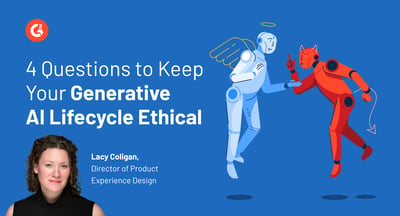May 14, 2025
 by Marty Duffy / May 14, 2025
by Marty Duffy / May 14, 2025

Did you know that being at a company for nearly a decade puts you in a remarkably exclusive club these days?
On February 22, 2025, I celebrated my nine-year anniversary at G2, joining a tiny 0.7% club of company veterans. Just four of us have reached this milestone in an industry where lasting relationships have become increasingly uncommon.
G2 is not alone in statistics like these. As of 2024, the USA has seen a 15% decrease in average job tenure over the last decade. If we dial in specifically on the technology sector, the average tenure is even lower. Across the 10 biggest tech companies, the average tenure was in the 1-2 year range, more than 50% lower than in other industries. If you work in the technology sector, you have likely seen this firsthand.
There is an unspoken belief in tech that long tenures are a bad thing. Gone are the days of company loyalty being seen as a benefit. Long tenure can be seen as the inability to change or grow.
I hold a different belief. I believe the tech sector fuels this point of view, but there is a counterculture approach that can help you and your career. In this article, I’ll unpack the benefits of long-term stays in tech companies and how they can actually be a competitive advantage.
I started at G2 on February 22, 2016. When I joined, the company was four years into its journey, and I was employee number 60 or so. At the time, I was relocating from Seattle to Chicago. To be frugal, based on where G2 was in its journey, I made the move via a 16-foot truck that my friend Billy and I drove from Seattle to Chicago.
I began my G2 career in the market research team as the director of research. Tim Handorf, CEO at the time, sold me on the role, thinking of it as product management for taxonomies. I spent two years on the market research team, helping to enhance the ways of working to scale G2’s taxonomy footprint, report creation, and review collection and moderation. We grew the team into multiple disciplines. At that point, Tim Handorf then asked me to help out on the product team. This is where I have been for the last seven years.
Over these nine years, I’ve seen many growths and shifts at G2. I remember the one million, two million, and soon-to-be three million review milestones. I remember handwriting our first reports. I’ve seen three CROs, four CMOs, and a shift of CEOs. I’ve seen acquisitions start and sunset. Nine years cover a lot of history, a lot of learning, a lot of growth, and a lot of change.
I could never have predicted the majority of these milestones. When Tim, Godard, Matt, Mark, and Mike founded G2 in 2012, I remember thinking, “How will they make money?” Four years later, I would not have expected to join them, and nine years later, I would not have predicted all the ups and downs we’d have been through.
As humans, it is natural for us to see what others are doing and consider this the norm. When we see things that are against this norm, we question them.
According to the Bureau of Labor Statistics, the overall average tenure of US workers is roughly 4.1 years. However, in the tech sector, the average tenure is shorter at around 2-3 years. Large tech companies often see even shorter tenures at 1-3 years.
Over time, the tech industry has created a norm of shorter tenures. Longer tenures are seen as the exception. And when that tenure increases to 2x, 3x, or 4x the norm, it is even rarer.
As I reflect on my long tenure and hear from others who are in the 0.7%, I’ve cataloged a few reactions we have heard:
You also hear genuinely curious questions:
If you boil down all these questions, you’ll see a belief that longer-tenured employees are at risk for slower skill development, career advancement, and salary growth stagnation. I believe this is a misconception.
G2 is not my only long tenure with a technology company. I spent seven years with a configure, price, quote (CPQ) company called BigMachines, which was acquired by Oracle. I spent three years with a non-profit organization named World Vision. As mentioned, I’m continuing to spend over nine years at G2.
Here are a few counterculture perspectives on why staying for a long period of time is beneficial.
With an open mindset and humility, you may be surprised by what roles open up for you. In my own experience, I have seen and been given the opportunity to help stand up new roles that previously did not exist, and fill roles outside my base skillset when there is potential. These opportunities open up naturally as companies scale and grow. By doing a great job in your own role and staying connected to peers and the business, you can find yourself in a position for career advancement.
If you do this well, over time, you will build a reputation as someone who keeps the company in mind and is a trusted advisor and mentor to others. New hires will seek out your advice.
Staying with a company long enough to see a project move from a whiteboard idea to a fully mature program is a unique learning experience. You develop a deep understanding of the "why" behind decisions, not just the "what" that gets executed. You see what works, what doesn’t, and most importantly, why it played out that way. This kind of end-to-end visibility is hard to replicate when you’re jumping from company to company every few years.
Longevity also gives you front-row seats to how a company evolves through different stages of growth — whether that’s product-market fit, go-to-market scaling, or global expansion. You learn what it means to operate in a scrappy startup mode and how things shift as process, structure, and complexity increase.
That kind of scale knowledge becomes a superpower. You understand the patterns and pitfalls of each stage and can offer valuable guidance during transitions. It’s one thing to read about growth curves; it’s another to live through them and help navigate the roadblocks in real time.
One of the most overlooked benefits of staying is the depth of relationships you’re able to build over time. You develop a trust that can't be manufactured when you’ve worked alongside someone for years through launches, pivots, challenges, and wins.
These aren’t just transactional work relationships; they’re built on shared experiences, mutual growth, and a lot of candid conversations along the way. That foundation makes collaboration easier, feedback more meaningful, and results stronger. It also creates a sense of community that makes work more fulfilling — something that’s hard to find when you’re constantly starting over. The same is true for client relationships. Longevity builds credibility.
A valuable piece of career advice I've held onto is this: When evaluating your career path, focus on three key factors — company size, industry, and position.
For sustainable career growth, limit yourself to changing just one of these variables at a time. This approach helps you to leverage existing knowledge while strategically expanding your expertise.
Considering that staying with one company means that unless the company shifts substantially, the industry will not change, for your own growth, you need to look at either company size or position.
Even if you're not actively job searching, always be on the lookout for new challenges within your company. Growth doesn’t always mean climbing up — it can mean growing outward into new functions, skill sets, or projects that stretch you.
Sometimes, others see potential in you before you do. Saying “yes” to the right opportunity, even if it's outside your comfort zone, can lead to some of your most valuable growth.
Look at leaders like Bill McDermott, who didn’t rush up the ladder but built real depth at each stage. Staying at one company gives you the chance to develop a wide-angle lens, understand the business at multiple stages of growth, and build a reputation of trust and consistency over time.
Sometimes, the best move for your career is to get closer to the work again. Stepping out of a leadership role isn’t a step back; it’s a strategic decision to learn, recharge, and refocus. I’ve done this myself and found it incredibly rewarding.
It’s easy to tie your value to your org chart. But the real impact isn’t always reflected in a title. What matters more is how you show up, how you contribute, and how you grow — no matter the size of your team.
Don’t rest on “we’ve always done it that way” or “we’ve tried that already.” These are the easiest ways to shut down innovation. Long tenure gives you context, but don’t let it turn into complacency. Keep asking “what if?” even when you’ve seen a few “what ifs” fail.
No matter how long you’ve been somewhere, there’s always something new to learn.
Experience is valuable — but only if it’s shared. Your insights matter more when they’re part of a larger conversation. Make space to collaborate, mentor, and co-create.
Your network inside the company is one of your greatest assets. Don’t silo yourself. Regularly check in with people beyond your immediate team to stay in sync with where the company is headed.
One major advantage of long tenure is your deep understanding of the business. But even that can fade if you’re not actively keeping up. Stay curious about how your product is evolving, what your customers say, and how the market is shifting.
I hope that at this point, I’ve convinced you of the benefits of longer tenure, particularly in the technology space. My sincere hope is that this may inspire some to not move on from their own company, but instead consider what the next step they can take is, where they are. If you are at a company, look around for those long-tenured folks and reach out to them — they are likely a treasure trove of insights and information.
Staying in one company beyond average norms gives unique opportunities for career advancement, learning, relationship building, and a differentiator of company scaling insights.
Reflecting on my nine years here at G2, not every year has been roses and rainbows, but that is reality. Staying on the journey, consistent with your values, and looking for opportunities for growth will guide you to new heights if you stay humble, curious, and open-minded. I can’t predict how many more years I will be at G2 or what opportunities may arise. What I can predict is how I choose to show up every day.
If you enjoyed this article and have your own story or questions, I’d love to connect on LinkedIn!
Learn more about investing in yourself and upgrading your professional development strategies.
Marty Duffy is the SVP of Product R&D Operations at G2. Marty has been working on the web for over 15 years at companies ranging from start-ups to enterprises and in both the non-profit and for-profit sectors. Marty is a generalist by nature with a horizontal breadth of experience and deep specialties in operations, services, and product. In his spare time, Marty loves spending time with his family and his church. With any free time remaining, he chooses between board games, golf, or reading.
Sell smart, win more. This is the approach high-performing B2B sales professionals embrace to...
 by Julie Jung
by Julie Jung
A year ago, if I’d said “AI" at my dinner table, my (mature) family wouldn’t have known what I...
 by Lacy Coligan
by Lacy Coligan
It’s clear that AI is here to stay, with many of us (myself included) using AI to help us...
 by Marty Duffy
by Marty Duffy
Sell smart, win more. This is the approach high-performing B2B sales professionals embrace to...
 by Julie Jung
by Julie Jung
A year ago, if I’d said “AI" at my dinner table, my (mature) family wouldn’t have known what I...
 by Lacy Coligan
by Lacy Coligan


